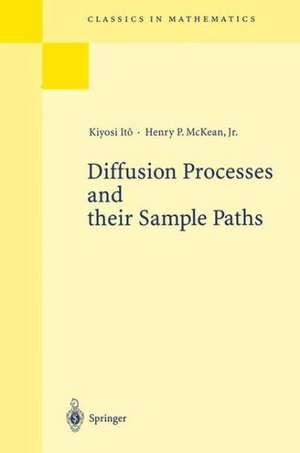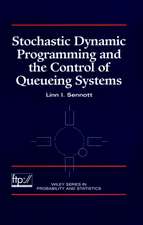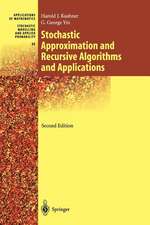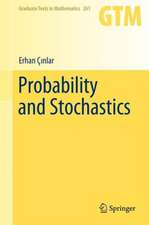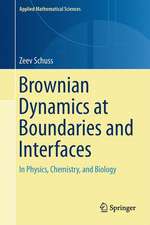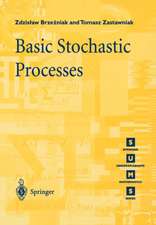Diffusion Processes and their Sample Paths: Classics in Mathematics
Autor Kiyosi Itô, Henry P. Jr. McKeanen Limba Engleză Paperback – 5 ian 1996
Din seria Classics in Mathematics
-
 Preț: 404.20 lei
Preț: 404.20 lei -
 Preț: 428.09 lei
Preț: 428.09 lei -
 Preț: 400.48 lei
Preț: 400.48 lei -
 Preț: 404.37 lei
Preț: 404.37 lei -
 Preț: 402.28 lei
Preț: 402.28 lei -
 Preț: 422.11 lei
Preț: 422.11 lei -
 Preț: 438.87 lei
Preț: 438.87 lei -
 Preț: 431.56 lei
Preț: 431.56 lei -
 Preț: 425.80 lei
Preț: 425.80 lei -
 Preț: 429.61 lei
Preț: 429.61 lei -
 Preț: 421.72 lei
Preț: 421.72 lei -
 Preț: 425.80 lei
Preț: 425.80 lei -
 Preț: 422.90 lei
Preț: 422.90 lei -
 Preț: 427.49 lei
Preț: 427.49 lei -
 Preț: 421.17 lei
Preț: 421.17 lei -
 Preț: 415.39 lei
Preț: 415.39 lei -
 Preț: 485.07 lei
Preț: 485.07 lei -
 Preț: 437.72 lei
Preț: 437.72 lei -
 Preț: 444.47 lei
Preț: 444.47 lei -
 Preț: 440.39 lei
Preț: 440.39 lei -
 Preț: 447.73 lei
Preț: 447.73 lei -
 Preț: 438.10 lei
Preț: 438.10 lei -
 Preț: 509.50 lei
Preț: 509.50 lei -
 Preț: 418.83 lei
Preț: 418.83 lei -
 Preț: 436.74 lei
Preț: 436.74 lei -
 Preț: 446.37 lei
Preț: 446.37 lei -
 Preț: 430.59 lei
Preț: 430.59 lei -
 Preț: 421.93 lei
Preț: 421.93 lei -
 Preț: 429.06 lei
Preț: 429.06 lei -
 Preț: 431.56 lei
Preț: 431.56 lei -
 Preț: 457.36 lei
Preț: 457.36 lei -
 Preț: 429.99 lei
Preț: 429.99 lei -
 Preț: 504.66 lei
Preț: 504.66 lei -
 Preț: 433.31 lei
Preț: 433.31 lei -
 Preț: 418.07 lei
Preț: 418.07 lei -
 Preț: 427.33 lei
Preț: 427.33 lei -
 Preț: 437.50 lei
Preț: 437.50 lei -
 Preț: 425.80 lei
Preț: 425.80 lei -
 Preț: 438.26 lei
Preț: 438.26 lei -
 Preț: 408.62 lei
Preț: 408.62 lei -
 Preț: 432.51 lei
Preț: 432.51 lei -
 Preț: 429.61 lei
Preț: 429.61 lei -
 Preț: 435.20 lei
Preț: 435.20 lei -
 Preț: 428.68 lei
Preț: 428.68 lei -
 Preț: 437.12 lei
Preț: 437.12 lei -
 Preț: 438.69 lei
Preț: 438.69 lei
Preț: 428.07 lei
Nou
Puncte Express: 642
Preț estimativ în valută:
81.92€ • 85.21$ • 67.63£
81.92€ • 85.21$ • 67.63£
Carte tipărită la comandă
Livrare economică 15-29 aprilie
Preluare comenzi: 021 569.72.76
Specificații
ISBN-13: 9783540606291
ISBN-10: 3540606297
Pagini: 348
Ilustrații: XV, 323 p.
Dimensiuni: 155 x 235 x 23 mm
Greutate: 0.58 kg
Ediția:1996
Editura: Springer Berlin, Heidelberg
Colecția Springer
Seria Classics in Mathematics
Locul publicării:Berlin, Heidelberg, Germany
ISBN-10: 3540606297
Pagini: 348
Ilustrații: XV, 323 p.
Dimensiuni: 155 x 235 x 23 mm
Greutate: 0.58 kg
Ediția:1996
Editura: Springer Berlin, Heidelberg
Colecția Springer
Seria Classics in Mathematics
Locul publicării:Berlin, Heidelberg, Germany
Public țintă
ResearchCuprins
Prerequisites.- 1. The standard BRownian motion.- 1.1. The standard random walk.- 1.2. Passage times for the standard random walk.- 1.3. Hin?in’s proof of the de Moivre-laplace limit theorem.- 1.4. The standard Brownian motion.- 1.5. P. Lévy’s construction.- 1.6. Strict Markov character.- 1.7. Passage times for the standard Brownian motion.- 1.8. Kolmogorov’s test and the law of the iterated logarithm.- 1.9. P. Lévy’s Hölder condition.- 1.10. Approximating the Brownian motion by a random walk.- 2. Brownian local times.- 2.1. The reflecting Brownian motion.- 2.2. P. Lévy’s local time.- 2.3. Elastic Brownian motion.- 2.4. t+ and down-crossings.- 2.5. T+ as Hausdorff-Besicovitch 1/2-dimensional measure.- 2.6. Kac’s formula for Brownian functionals.- 2.7. Bessel processes.- 2.8. Standard Brownian local time.- 2.9. BrowNian excursions.- 2.10. Application of the Bessel process to Brownian excursions.- 2.11. A time substitution.- 3. The general 1-dimensional diffusion.- 3.1. Definition.- 3.2.Markov times.- 3.3. Matching numbers.- 3.4. Singular points.- 3.5. Decomposing the general diffusion into simple pieces.- 3.6. Green operators and the space D.- 3.7. Generators.- 3.8. Generators continued.- 3.9. Stopped diffusion.- 4. Generators.- 4.1. A general view.- 4.2. G as local differential operator: conservative non-singular case.- 4.3. G as local differential operator: general non-singular case.- 4.4. A second proof.- 4.5. G at an isolated singular point.- 4.6. Solving G•u = ? u.- 4.7. G as global differential operator: non-singular case.- 4.8. G on the shunts.- 4.9. G as global differential operator: singular case.- 4.10. Passage times.- 4.11. Eigen-differential expansions for Green functions and transition densities.- 4.12. Kolmogorov’s test.- 5. Time changes and killing.- 5.1. Construction of sample paths: a general view.- 5.2. Time changes: Q = R1.- 5.3. Time changes: Q = [0, + ?).- 5.4. Local times.- 5.5. Subordination and chain rule.- 5.6. Killing times.- 5.7. Feller’sBrownian motions.- 5.8. Ikeda’s example.- 5.9. Time substitutions must come from local time integrals.- 5.10. Shunts.- 5.11. Shunts with killing.- 5.12. Creation of mass.- 5.13. A parabolic equation.- 5.14. Explosions.- 5.15. A non-linear parabolic equation.- 6. Local and inverse local times.- 6.1. Local and inverse local times.- 6.2. Lévy measures.- 6.3. t and the intervals of [0, + ?) - ?.- 6.4. A counter example: t and the intervals of [0, + ?) - ?.- 6.5a t and downcrossings.- 6.5b t as Hausdorff measure.- 6.5c t as diffusion.- 6.5d Excursions.- 6.6. Dimension numbers.- 6.7. Comparison tests.- 6.8. An individual ergodic theorem.- 7. Brownian motion in several dimensions.- 7.1. Diffusion in several dimensions.- 7.2. The standard Brownian motion in several dimensions.- 7.3. Wandering out to ?.- 7.4. Greenian domains and Green functions.- 7.5. Excessive functions.- 7.6. Application to the spectrum of ?/2.- 7.7. Potentials and hitting probabilities.- 7.8. Newtonian capacities.- 7.9. Gauss’s quadratic form.- 7.10. Wiener’s test.- 7.11. Applications of Wiener’s test.- 7.12. Dirichlet problem.- 7.13. Neumann problem.- 7.14. Space-time Brownian motion.- 7.15. Spherical Brownian motion and skew products.- 7.16. Spinning.- 7.17. An individual ergodic theorem for the standard 2-dimensional BROWNian motion.- 7.18. Covering Brownian motions.- 7.19. Diffusions with Brownian hitting probabilities.- 7.20. Right-continuous paths.- 7.21. Riesz potentials.- 8. A general view of diffusion in several dimensions.- 8.1. Similar diffusions.- 8.2. G as differential operator.- 8.3. Time substitutions.- 8.4. Potentials.- 8.5. Boundaries.- 8.6. Elliptic operators.- 8.7. Feller’s little boundary and tail algebras.- List of notations.
Recenzii
"The systematic character of the exposision, which makes from the widely ramified subject matter of the extensive literature a clear, masterly arranged whole, is a particularly valuable feature of this monograph." (Publicationes Mathematicae)
Notă biografică
Biography of Kiyosi Itô
Kiyosi Itô was born on September 7, 1915, in Kuwana, Japan. After his undergraduate and doctoral studies at Tokyo University, he was associate professor at Nagoya University before joining the faculty of Kyoto University in 1952. He has remained there ever since and is now Professor Emeritus, but has also spent several years at each of Stanford, Aarhus and Cornell Universities and the University of Minnesota.
Itô's fundamental contributions to probability theory, especially the creation of stochastic differential and integral calculus and of excursion theory, form a cornerstone of this field. They have led to a profound understanding of the infinitesimal development of Markovian sample paths, and also of applied problems and phenomena associated with the planning, control and optimization of engineering and other random systems.
Professor Itô has been the inspirer and teacher of an entire generation of Japanese probabilists.
Biography of Henry McKean
Henry McKean was born on December 14, 1930, in Wenham, Massachusetts. He studied mathematics at Dartmouth College, Cambridge University, and Princeton University; he received his degree from the last in 1955. He has held professional positions at Kyoto University, MIT, Rockefeller University, Weizmann Institute, Balliol College, Oxford, and the Courant Institute of Mathematical Sciences (1969 to present). His main interests are probability, Hamiltonian mechanics, complex function theory, and nonlinear partial differential equations.
Kiyosi Itô was born on September 7, 1915, in Kuwana, Japan. After his undergraduate and doctoral studies at Tokyo University, he was associate professor at Nagoya University before joining the faculty of Kyoto University in 1952. He has remained there ever since and is now Professor Emeritus, but has also spent several years at each of Stanford, Aarhus and Cornell Universities and the University of Minnesota.
Itô's fundamental contributions to probability theory, especially the creation of stochastic differential and integral calculus and of excursion theory, form a cornerstone of this field. They have led to a profound understanding of the infinitesimal development of Markovian sample paths, and also of applied problems and phenomena associated with the planning, control and optimization of engineering and other random systems.
Professor Itô has been the inspirer and teacher of an entire generation of Japanese probabilists.
Biography of Henry McKean
Henry McKean was born on December 14, 1930, in Wenham, Massachusetts. He studied mathematics at Dartmouth College, Cambridge University, and Princeton University; he received his degree from the last in 1955. He has held professional positions at Kyoto University, MIT, Rockefeller University, Weizmann Institute, Balliol College, Oxford, and the Courant Institute of Mathematical Sciences (1969 to present). His main interests are probability, Hamiltonian mechanics, complex function theory, and nonlinear partial differential equations.
Textul de pe ultima copertă
Since its first publication in 1965 in the series Grundlehren der mathematischen Wissenschaften this book has had a profound and enduring influence on research into the stochastic processes associated with diffusion phenomena. Generations of mathematicians have appreciated the clarity of the descriptions given of one- or more- dimensional diffusion processes and the mathematical insight provided into Brownian motion. Now, with its republication in the Classics in Mathematics it is hoped that a new generation will be able to enjoy the classic text of Itô and McKean.
